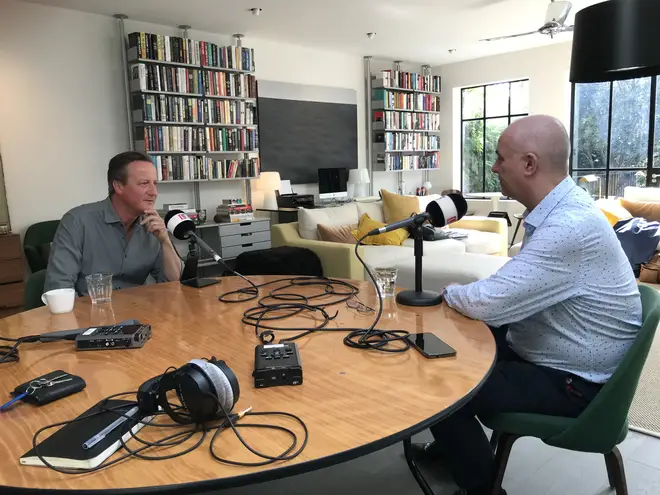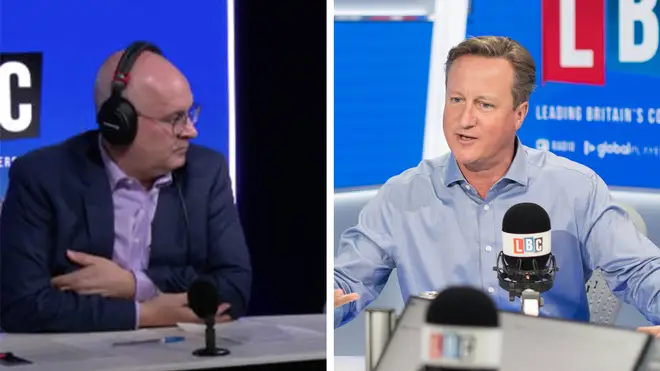
Henry Riley 7pm - 10pm
17 September 2020, 14:09 | Updated: 17 September 2020, 16:48

Former Prime Minister David Cameron is calling for a mass coronavirus testing regime, telling LBC’s Iain Dale it is the only way to get back to “normal life”.
In a revealing and extended interview, Mr Cameron admitted that he and other former Prime Ministers, including Tony Blair, are “keen to encourage the Government down that path” in the absence of a vaccine.
“The danger at the moment is we’re very reactive,” he said.
You can hear the full interview tonight at 8pm on LBC.
Below, Iain Dale reveals his observations on how David Cameron is coping with life outside of Downing Street and how the former PM wants to avoid turning into a ‘rent-a-gob ex politician.’
The first thing you notice about David Cameron’s home is how normal it is. Lived in. Modern. Chillaxy.
As we walked through the door to set up for our interview the sight of the former prime minister on the couch, legs up on the footstool fiddling with his phone, is perhaps not the thing you expect to see.
But Cameron is no formulaic ex-Prime Minister. He likes to dress casually. After our interview, he’s about to drive to see his mother. He’s keen to get on with it.
The last time I was here was two years ago when I was writing a profile of Gavin Williamson for the Sunday Times magazine. He had been Cameron’s PPS and I thought he’d be able to give me some off the record colour.
And so it proved. Having said that, we spent ten minutes discussing Williamson and then about 45 minutes gossiping about the state of politics.
Seeing him again, two years on, there’s a sense of a man unfulfilled. He won’t admit it, of course, but he’s still struggling to find a real raison d’etre. Four years on, he’s built up a portfolio existence, but it’s clear that he feels unchallenged.
He belongs to a club of five ex-Premiers, although he’s quick to deny there’s a trade union, even if they talk to each other quite often. In this country, we don’t really know what to do with ex-Prime Ministers. Former US presidents still command the cachet of the office they once held. Here, not so much. Cameron has made a point of not being a rent-a-gob ex politician.

He knows that there is a perception that he left office ingloriously and regrets the way it all happened so quickly. He thought he would have another couple of months to say goodbye and explain properly why he felt it was better if a new PM took us through the Brexit negotiations.
Andrea Leadsom’s withdrawal from the leadership race put paid to that. It clearly still rankles that many people think he ran away.
In my hour with him, we certainly covered a lot of ground, as you will hear, but it’s always the case in interviews like this that once the mic goes off you think of all the things you didn’t ask him rather than the ones you did. I very rarely come out of an interview thinking, wow, that was brilliant. I am useless at spotting news lines in long sit down interviews.
I remember once emerging from No 10 after an interview with Theresa May, almost in tears because I felt I had got nothing out of her in the time allowed by her then Head of Broadcasting, a certain Mr Tom Swarbrick.
He said I could have 8 minutes, which I managed to stretch to 12, ignoring his gestures for me to wind up. Sorry Tom.
In fact, as my two producers informed me as we were walking back along Downing Street, there were four big stories to come out of it, and so it proved.
As I write in my new book, too many people nowadays think that interviews with politicians should be “grillings” and the interviewer should be gratuitously rude, and even shout. That approach does not work. The politician just puts the shutters up.
So if you’re expecting fireworks, you’re going to be disappointed. If you are interested in what motivated Cameron and why he did the things he did, I hope you’ll feel a bit better informed at the end of this interview than you were at the beginning.